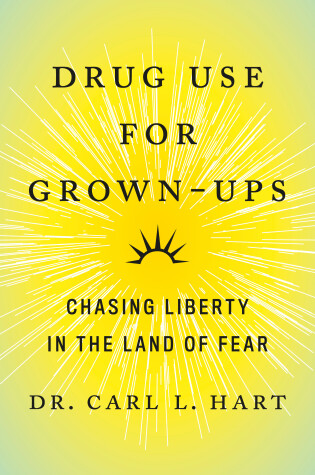
“Hart’s argument that we need to drastically revise our current view of illegal drugs is both powerful and timely . . . when it comes to the legacy of this country’s war on drugs, we should all share his outrage.” —The New York Times Book Review
From one of the world's foremost experts on the subject, a powerful argument that the greatest damage from drugs flows from their being illegal, and a hopeful reckoning with the possibility of their use as part of a responsible and happy life
Dr. Carl L. Hart, Ziff Professor at Columbia University and former chair of the Department of Psychology, is one of the world's preeminent experts on the effects of so-called recreational drugs on the human mind and body. Dr. Hart is open about the fact that he uses drugs himself, in a happy balance with the rest of his full and productive life as a researcher and professor, husband, father, and friend. In Drug Use for Grown-Ups, he draws on decades of research and his own personal experience to argue definitively that the criminalization and demonization of drug use--not drugs themselves--have been a tremendous scourge on America, not least in reinforcing this country's enduring structural racism.
Dr. Hart did not always have this view. He came of age in one of Miami's most troubled neighborhoods at a time when many ills were being laid at the door of crack cocaine. His initial work as a researcher was aimed at proving that drug use caused bad outcomes. But one problem kept cropping up: the evidence from his research did not support his hypothesis. From inside the massively well-funded research arm of the American war on drugs, he saw how the facts did not support the ideology. The truth was dismissed and distorted in order to keep fear and outrage stoked, the funds rolling in, and Black and brown bodies behind bars.
Drug Use for Grown-Ups will be controversial, to be sure: the propaganda war, Dr. Hart argues, has been tremendously effective. Imagine if the only subject of any discussion about driving automobiles was fatal car crashes. Drug Use for Grown-Ups offers a radically different vision: when used responsibly, drugs can enrich and enhance our lives. We have a long way to go, but the vital conversation this book will generate is an extraordinarily important step.
Interesting Perspective Marred By Bias And Lack Of Scholarly Rigor. Let me state up front: I am a former Libertarian Party official at the State and local level, and an avowed anarchist to boot. I fully concur with Dr. Hart's position that all drugs should be fully decriminalized. And it was this agreement that had me initially wanting to rate this book at a full 5*.
But considering the actual arguments and the actual text presented, I cannot claim to be an objective judge of the merits of the books I'm reading if I did that. Because there are definite problems with this book that I've called out in no uncertain terms when I *didn't* agree with the author's positions - and thus I cannot ignore them here, when I do largely agree with the author's positions.
Specifically, there is quite a bit of anti-white "they're all just a bunch of racist pieces of shit" strawmen commentary in this text. Numerous cases where Hart blames racism rather than applying Hanlon's Razor or even looking for alternative, non-race based reasonings for his opponents' positions. And having been on both sides of this debate at different times in my life, I can testify as a fellow Son of the South (rural exurbs outside Atlanta vs Hart's coming of age in urban Miami) that there *are* several other rationales other than the racism Hart claims is at the heart of all anti-drug laws.
Further, barely 12% of this text is bibliography, despite Hart claiming numerous times "I know I'm going to have to present some evidence here since this is not a commonly held position". More often than not, rather than actually examining studies showing various harms from various substances, Hart dismisses them with the hand wave of a professor more concerned with getting his own point across, "there is no basis for that claim, we're moving on".
I actually enjoyed the less formal tone of the presentation here, as it made the book overall far more readable than some academics make their narratives. I simply wish the narrative were more substantive.
Recommended.
Reading updates
-
Started reading
-
18 June, 2021:
Finished reading
-
18 June, 2021:
Reviewed
